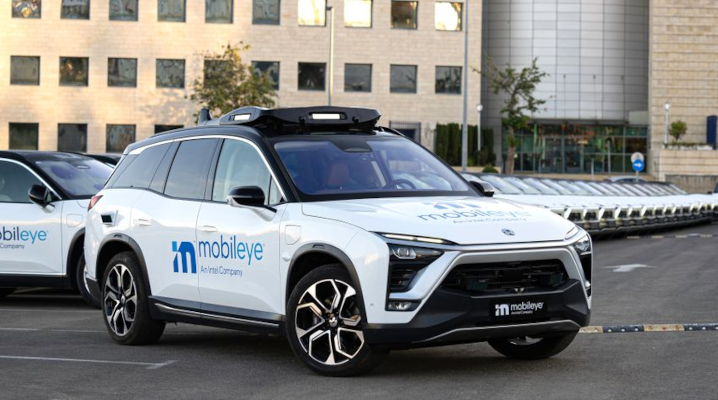 EMERGING TECH
EMERGING TECH
 EMERGING TECH
EMERGING TECH
 EMERGING TECH
EMERGING TECH
Vehicle chip supplier Mobileye Global Inc. today posted strong fourth-quarter financial results that topped analysts’ expectations.
The company’s adjusted net income jumped 121% year-over-year in the three months ended Dec. 31, to $217 million. That translated into adjusted earnings per share of 27 cents. Analysts polled for the Refinitiv consensus estimate had expected the company to report 17 cents per share.
Mobileye also significantly grew its top line in the fourth quarter. Revenues reached $565 million, well above the $535.82 million projected by analysts, after jumping 59% year-over-year.
Sales of its flagship EyeQ system-on-chip series grew 48% during the first quarter. Automakers install the chips in their vehicles to equip them with partly autonomous driving features. Its most advanced processor, the EyeQ Ultra, combines a dozen central processing unit cores with machine learning accelerators and other specialized compute modules.
Mobileye offers several product bundles that integrate EyeQ chips with other vehicle technologies. One such bundle, SuperVision, pairs two of the company’s chips with sensors and autonomous driving features. The system enables vehicles to perform a limited set of driving tasks such as lane changing without human input.
According to Mobileye, SuperVision drove a substantial portion of its revenue growth in the fourth quarter even though the system currently accounts for less than 1% of its unit volume. The offering also helped increase the average selling price of its products. The average sale price increased to $56.20 in the fourth quarter from $48.30 a year ago.
“Our fourth-quarter performance is an excellent example of how ramping volumes of our advanced solutions can impact financial performance, as higher average system price amplified strong volume growth, leading to 59% overall revenue growth,” said Chief Executive Officer Amnon Shashua.
Mobileye is currently developing a more advanced version of SuperVision called Chauffeur. Whereas Supervision includes two EyeQ chips, Chauffeur features six. It’s designed to power vehicles with Level 4 autonomy, or vehicles that can drive without human input in most situations.
According to Mobileye, one auto industry customer plans to order $1.5 billion worth of Chauffeur systems through 2030. Across all its product lines, the company expects to sell $17 billion worth of hardware and software by the end of the decade.
The company is also optimistic about its near-term revenue growth prospects. The revenue guidance released by the company today forecasts sales of between $2.19 billion and $2.28 billion for its 2023 fiscal year. The midpoint of the range is higher than the $2.21 billion the Refinitiv consensus estimate projected.
Mobileye faces competition from multiple other chipmakers including Qualcomm Inc., which historically focused mainly on the handset market. In 2020, Qualcomm introduced a line of systems-on-chip for vehicles called the Snapdragon Ride series. The company last year detailed that auto sector customers expect to buy $30 billion worth of its products through 2030.
Qualcomm also offers autonomous driving software tools alongside its vehicle chips. In 2021, the company teamed up with an investment firm to buy vehicle technology provider Veoneer Inc. for $4.5 billion. As part of the deal, Qualcomm obtained Veoneer’s Arriver business, which develops software for autonomous vehicles.
Support our mission to keep content open and free by engaging with theCUBE community. Join theCUBE’s Alumni Trust Network, where technology leaders connect, share intelligence and create opportunities.
Founded by tech visionaries John Furrier and Dave Vellante, SiliconANGLE Media has built a dynamic ecosystem of industry-leading digital media brands that reach 15+ million elite tech professionals. Our new proprietary theCUBE AI Video Cloud is breaking ground in audience interaction, leveraging theCUBEai.com neural network to help technology companies make data-driven decisions and stay at the forefront of industry conversations.